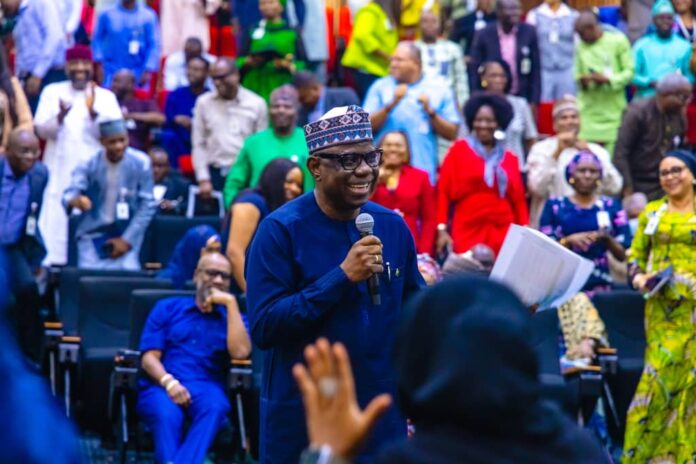The Minister of Budget and Economic Planning, Senator Abubakar Bagudu, has lauded the economic transformation witnessed in Northern Nigeria under the administration of President Bola Ahmed Tinubu, citing significant increases in state revenues and a sharp decline in regional debt levels.

Speaking in Kaduna during a two-day interactive session organised by the Sir Ahmadu Bello Memorial Foundation, Bagudu declared that the North has recorded unprecedented economic progress due to the bold fiscal reforms championed by the Tinubu-led government. The theme of the session was “Assessing Electoral Promises: Fostering Government-Citizen Engagement for National Unity.”
Over 60 federal political appointees from the region, including Secretary to the Government of the Federation, Senator George Akume, key ministers, Northern governors, and thought leaders such as the Arewa Consultative Forum, attended the event.
Bagudu stated that since the removal of fuel subsidies and other macroeconomic reforms, federally allocated revenues to the states have more than doubled. Between May 2023 and June 2025, monthly net statutory and VAT allocations to states and local governments rose from ₦458.81 billion to ₦991.81 billion — an increase of ₦533 billion or 116.17%.
“The end of the fuel subsidy was a hard but necessary decision. It freed up trillions of naira for redistribution through the Federation Account, allowing state governments to invest more in social and infrastructural development,” Bagudu said.
He noted that Northern states have been among the top beneficiaries of this revenue growth. Gombe State saw a 272.35% increase in allocations, from ₦6.69 billion to ₦24.91 billion. Kaduna State’s allocation rose from ₦11.94 billion to ₦42.01 billion, a 251.84% increase. Regionally, the North Central’s share rose by 145%, the North East by 149%, and the North West by 143%.
Additionally, Bagudu reported a 42.06% reduction in the North’s domestic debt burden — from ₦1.98 trillion to ₦1.14 trillion — thanks to increased federal allocations and fiscal discipline. Nationally, subnational debt dropped by 33.4%, from ₦5.8 trillion to ₦3.8 trillion.
“These results reflect the Renewed Hope Agenda’s impact. It is delivering real value to Nigerians through stronger state fiscal capacity and more equitable revenue distribution,” he stated.
Bagudu also highlighted key infrastructure investments in Northern Nigeria under Tinubu’s administration. These include: Sokoto-Badagry Superhighway, dualisation of the Kano-Maiduguri Road, Abuja-Keffi-Makurdi, Abuja-Lokoja Roads, Kaduna-Kano, Kano-Katsina Road dualisation Kaduna-Kano Railway and Light Rail Projects in Kaduna, Kano, and FCT
